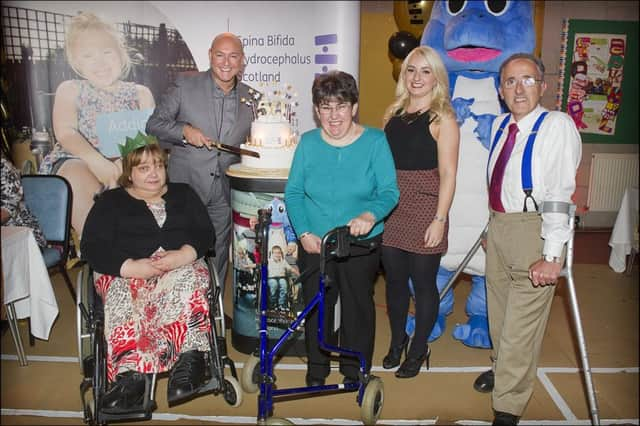SBH Scotland still helping to change lives 50 years on


“Mum believed that everyone should be given an equal chance to do what they wanted, to achieve what they wanted..I quite honestly believe that there’s nothing I couldn’t achieve if I wanted to.”
When Jon Wilson, 51, was born with the condition Spina Bifida Hydrocephalus, his mum, Elsie Wilson, made it her mission in life to make sure he could live his to the fullest extent possible.
Advertisement
Hide AdAdvertisement
Hide AdAfter extensive talks with her medical consultant, John Bently, Elsie established a parents group in their home town in Lanarkshire, in 1960.
With the help of colleagues in Glasgow, this evolved into Scottish Spina Bifida Association, now SBH Scotland, ing 1965, and now helps thousands of families every year.
Spina Bifida is a condition where there is a fault in the spinal column and the vertebrae do not form completely, causing problems with the nervous system. Anything below the fault can be affected, so it’s a very individual condition with each person being affected differently.
Born in 1924, Elsie lived a colourful life, before passing away in 2008, aged 84.
Wanting to be a doctor, but hampered by the outbreak of the Second World War, Elsie’s first job was as a receptionist in a Prisoner of War camp for Italian prisoners.
After living in London for several years, the family moved back to Scotland, where Jon and his twin brother were born. Having a twin who was unaffected by Spina Bifida was a blessing in disguise for Jon, who now works in the government’s mental health tribunal.
“I was fortunate in a way that I had a twin brother, who was not affected by the condition so I was watching him developing from a very young age and I wanted to do that as well. Every time I saw him do something, I said to my mum and dad ‘I want to do that as well’. It encouraged me to move forward to try to get myself upright and my mum and dad would put out carpets in the garden against the wall and watch me climbing up it with my hands, trying to get upright.”
Seeing Jon’s determination, they wanted to progress his development. “I was extremely fortunate to have very good parents. When we went to see my orthopaedic surgeon when I was about three, my Dad asked when was the best age to start wearing callipers. The surgeon said: ‘Oh no we don’t do that yet; it will probably be another year before we decide to do that’.
Advertisement
Hide AdAdvertisement
Hide Ad“Dad was very adamant that this was too long, so we went home and he made me my very first pair of crutches and callipers, to try to get me on to my feet. Six months later, we were back at the hospital showing my orthopaedic surgeon how I was on my feet. The surgeon phoned the appliances department right there and ordered me a set of callipers and crutches.
“From that point on, children of that age were then given callipers and crutches to encourage them to be up on their feet, which is great.”
Jon is now relatively mobile, mostly using crutches to get around, an attribute he credits his parents for. His mother worked tirelessly, trying to find answers to her questions.
“She wanted to find answers, but also worked trying to solve other issues for affected children, like getting them into school and getting them into other organisations. She felt that the charity should just be a place of information and bodies like the NHS should be taking on the development. It always seemed to come back to this organisation to help but she was determined to try and change this.”
As the Scottish Spina Bifida Association grew, it reformed into the Spina Bifida Hydrocephalus Scotland (SBH Scotland), which now supports more than 3,500 children, young people, adults, their family members and carers every year in Scotland whilst retaining their family orientated approach.
Now based at the Dan Young Support Centre in Cumbernauld, the charity works across Scotland, from Shetland to the Borders, and is the only dedicated charity of its kind in the country.
SBH Scotland provides critical support and information services such as their national helpline, health check clinics, one-to-one support, social groups, advice and training; and they’re all supported by donations.
It currently has 14 full-time and eight part-time staff, who work on projects across Scotland. Most of the original information for the charity was found by Elsie.
Advertisement
Hide AdAdvertisement
Hide Ad“She got jobs within NHS just because she wanted information. She would go and get a job with a particular department and then maybe a year or so later she’d give up that job because she got the information she needed.
“She was a great networker, she had this huge list of contacts and could gather someone’s life history within five minutes – she had a great talent I’m very proud of my mum’s achievements – what she did with very limited resources and funds is just incredible,” said Jon. “She was just a phenomenal woman, she really was.” “To me it was just and absolute privilege that I was connected to all this – it’s been quite something to watch how its evolved.”
He urges any young person who is affected, not just by Spina Bifida but any illness, to never let it limit you.
“Get out there and don’t let anybody stop you from doing anything. If you think you can achieve it go out there and prove that you can do it, it’s something that I’ve always done.
“Mum and dad always said they’d never stop me from doing anything and if I decided I wanted to do something that someone said I couldn’t, I went out to prove them wrong.”